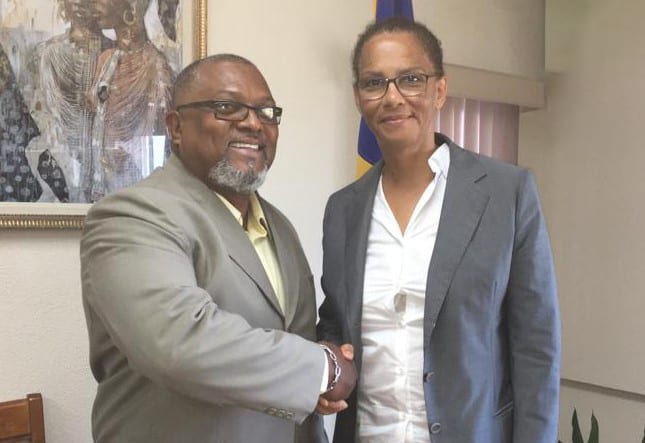
Minister of Agriculture and Food Security, Indar Weir, greets new FAO new Sub-Regional Coordinator for the Caribbean, Dr. Renata Clarke at a courtesy call at the Ministry of Agriculture today. (S.Forde/BGIS)
Barbados’ agricultural projects are of great interest to the Food and Agriculture Organization (FAO) of the United Nations’ new Sub-Regional Coordinator for the Caribbean, Dr. Renata Clarke.
This was disclosed today during a courtesy call with Minister of Agriculture and Food Security, Indar Weir, at the ministry’s headquarters, Graeme Hall, Christ Church.
The two officials discussed the continuous harmonious relationship between Barbados and FAO, and the continuity of funding and technical support from that organization.
Minister Weir expressed appreciation for the assistance and exchange of information over the years. Areas such as food sovereignty, chemical use within farming, the Parliamentary Fronts Against Hunger Programme, the farmers’ empowerment and enfranchisement drive (FEED) programme, sanitary and phytosanitary measures, fish waste treatment programmes and the black belly sheep programme were discussed for further development.
Mr. Weir also stated that it is of great importance to him as Minister of Agriculture that “we wean off chemical use within agriculture and get back to the old modalities of farming in Barbados”.
Dr. Clarke, who was previously Head of the Food Safety and Quality Unit, Office of Food Safety, FAO Rome, agreed with reducing the use of chemicals, and stressed that food safety was an area of great focus for the FAO, especially as it related to trade.
She was very keen on hearing more about the ministry’s plans for developing root crops (cassava, sweet potato and yam), the school feeding programme, and how FEED will play a role in providing better nutrition for the island’s schoolchildren.
Dr. Clarke said that many of the projects seem interesting and she was happy to know that “Barbados is so committed to the future of agriculture”.
She also shared that the FAO is in the process of doing an individual diet intake survey and with the data collected it would assist in forming policies for nutrition and identifying dietary patterns, which would help to assist how to go about integrating better nutrition around the world.
Other matters discussed included e-commerce, blockchain technology, alternate means of feed for animals, Greenland’s goat programme and the global action plan for the use of microbial data.
Dr. Clarke said that the FAO would be seeking to collect data on the use of microbes, and that she would like Barbados to be at the top of the class in submitting data, and be an example for the rest of the Caribbean.
